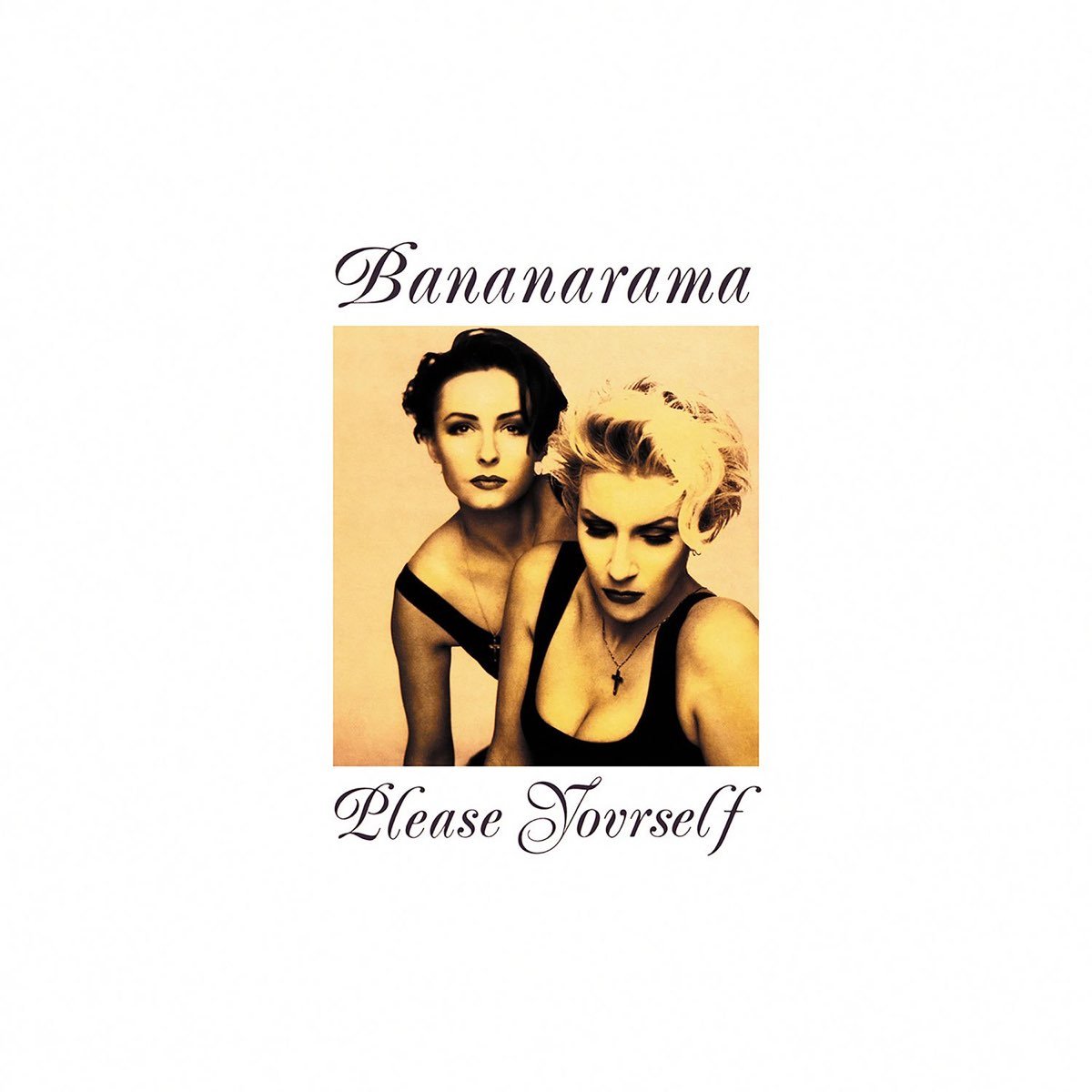Happy 40th Anniversary to Bananarama’s eponymous second studio album Bananarama, originally released April 21, 1984.
Arriving in record shops on March 7, 1983 via London Records, Deep Sea Skiving was a different kind of girl group album. The debut effort from Sara Dallin, Siobhan Fahey and Keren Woodward—known en bloc as Bananarama—was an eclectic long player that set itself to the British post-punk pop pulse with wit and humor to spare. Garnering a respectable amount of critical and commercial attention, Deep Sea Skiving was the remarkable culmination of happenstance, mischief, a bit of intent and a love for music that began two years before with their fiery cover of Black Blood’s 1975 single “Aie a Mwana,” as hosted on the boutique imprint Demon Records.
Soon enough, Bananarama were in possession of four U.K. Top 5 singles and the question was—could the ladies strike the iron twice? Some industry journalists had misread the group’s satirical embrace of an anti-fashion presentation without a hint of its purposeful irony. As quickly as Bananarama were lifted up in praise, these pundits began spinning the predictable yarn of Bananarama being a label gimmick that simply “got lucky.”
With Dallin, Fahey and Woodward only in competition with themselves, they let the critics talk and instead looked to what they could accomplish with their next project. The supposed curse of the “sophomore slump” proved to be no bother for them whatsoever.
As the initiating sessions for their self-titled song cycle sprang to life in April 1983, the threesome decided to once again partner—this time exclusively—with the writing/production duo, Steve Jolley and Tony Swain. Already experienced behind-the-boards draftsmen, Jolley and Swain were two of several key figures that assisted in the creation of Deep Sea Skiving. On that affair, the intuitive and headstrong trio clashed with Jolley and Swain. And so, during the construction of Bananarama those same passions again ran high. But, that occasional creative tension not only gave birth to a promising first single for Bananarama, it also gifted the world with a seminal girl group classic.
“Cruel Summer,” a humid slice of pop with textural undercurrents of R&B and Afro-Cuban elements, found itself serviced to British radio and retail outlets in June of 1983. Not only was the track a huge hit at home in England, it finally broke Bananarama in the United States one year later upon its release there. Complementing the single’s aural sophistication is its lyrical content—an immersive tale of unrequited love against the backdrop of an endless urban summer. “Cruel Summer” signaled that its parent record, still being completed at the time, would have its sonics and songwriting linked in a way that they had not been before.
Watch the Official Videos:
Upon its reveal in April 1984—ten months after the successful British launch of “Cruel Summer”—the sleeve notes for Bananarama featured a telling quote from poet/writer W.B. Yeats’ Easter, 1916: “Too long a sacrifice can make a stone of heart. O, when may it suffice?” Directly above that remark was a dedication to Thomas “Kidso” Reilly, a friend of Dallin, Fahey and Woodward whose death inspired the song script for “King of the Jungle.” Both the quote and dedication clued listeners in that a more serious perspective informed Bananarama.
Whether addressing the intersection of drug culture and youth culture on “Hotline to Heaven” or exploring societal anomie on “Rough Justice,” Dallin, Fahey and Woodward are insightful versus clumsy when broaching socially conscious themes. That former quality is especially true of “Robert De Niro’s Waiting,” a snappy takedown of “hero worship” as Woodward defined it in a 2012 interview when questioned about the song. However, many fans have speculated for decades that “Robert De Niro’s Waiting” subversively addressed rape with lines like, “A walk in the park can become a bad dream / People are staring and following me / This is my only escape from it all / Watching a film or a face on the wall…!”
On the opposite side of the tonal spectrum are entries such as “Dream Baby,” “State I’m In” and “The Wild Life” that bring in a touch of conventional pop sass to balance out Bananarama’s heavier sides. As an aside, “The Wild Life” wasn’t included on the first pressings of Bananarama, it was a soundtrack feature for the 1984 American teen film of the same name and was tacked on to secondary Bananarama pressings in that territory.
Musically, the arrangements of the album are as progressive as its songwriting. Throughout the long player a diverse range of sounds are at play, from the flavorful pop-soul of “Dream Baby” to the airy acoustic vibe of “Through a Child’s Eyes.” Bananarama have no sonics limits here.
The warm, expressive grooves of “Cruel Summer,” Rough Justice” and “King of the Jungle” are of particular notice, indebted to an immaculate fusion of expert synthesizer sequencing and live instrumentation that yields an exotic pop composite of world music and soul rhythms. “Link”—a crafty interlude used to indicate the end of Side A on the originating vinyl pressing that went unlisted on this format and found itself restored on the subsequent CD reissues—puts this method into action in lush cooperation with Bananarama’s unison vocal style. A major leap forward from Deep Sea Skiving, Bananarama saw Dallin, Fahey and Woodward vocally communicating with a more confident eloquence which gifted a deeper emotional potency to the music and words of the LP.
Enjoying this article? Click/tap on the album covers to explore more about Bananarama:
As 1984 wore on, Bananarama and its post-“Cruel Summer” singles—“Robert De Niro’s Waiting,” “Rough Justice,” “King of the Jungle,” “Hotline to Heaven” and “The Wild Life”—met mixed reviews and sales worldwide. While it was far and away from a chart misfire, it wasn’t exactly a triumph; larger commercial victories awaited Bananarama further into the 1980s with True Confessions (1986) and Wow! (1987).
Upon the dual reissues of Bananarama in 2007 and 2013, a critical revival led to the album’s recognition as an integral step in Dallin, Fahey and Woodward’s development as singers and writers. But, beyond the borders of these women’s own artful canon, Bananarama is a stellar assortment of songs shaped by an intelligence and intimacy that lends it a singular presence in the girl group oeuvre to this day.
LISTEN:
Editor's note: this anniversary tribute was originally published in 2019 and has since been edited for accuracy and timeliness.



